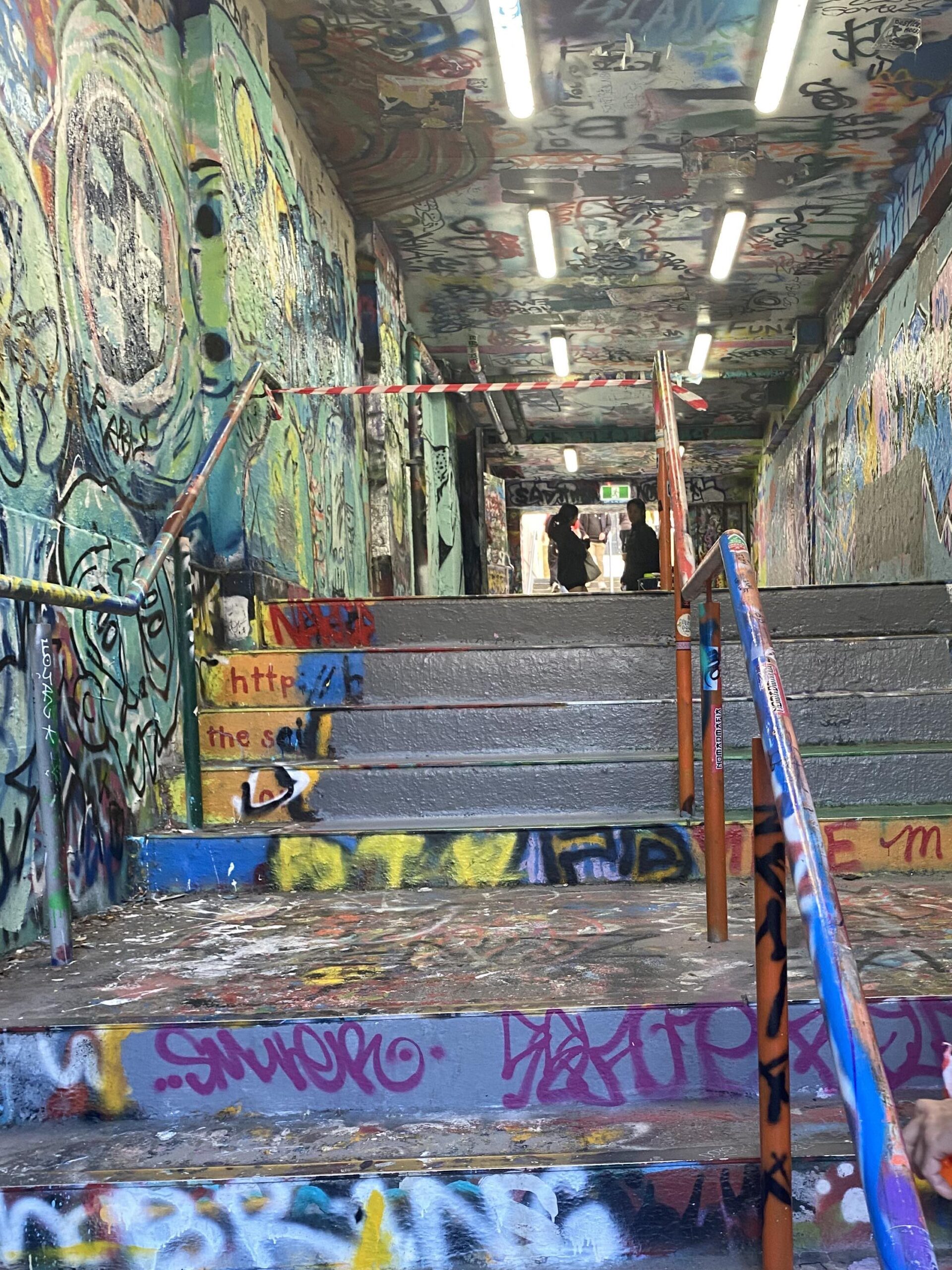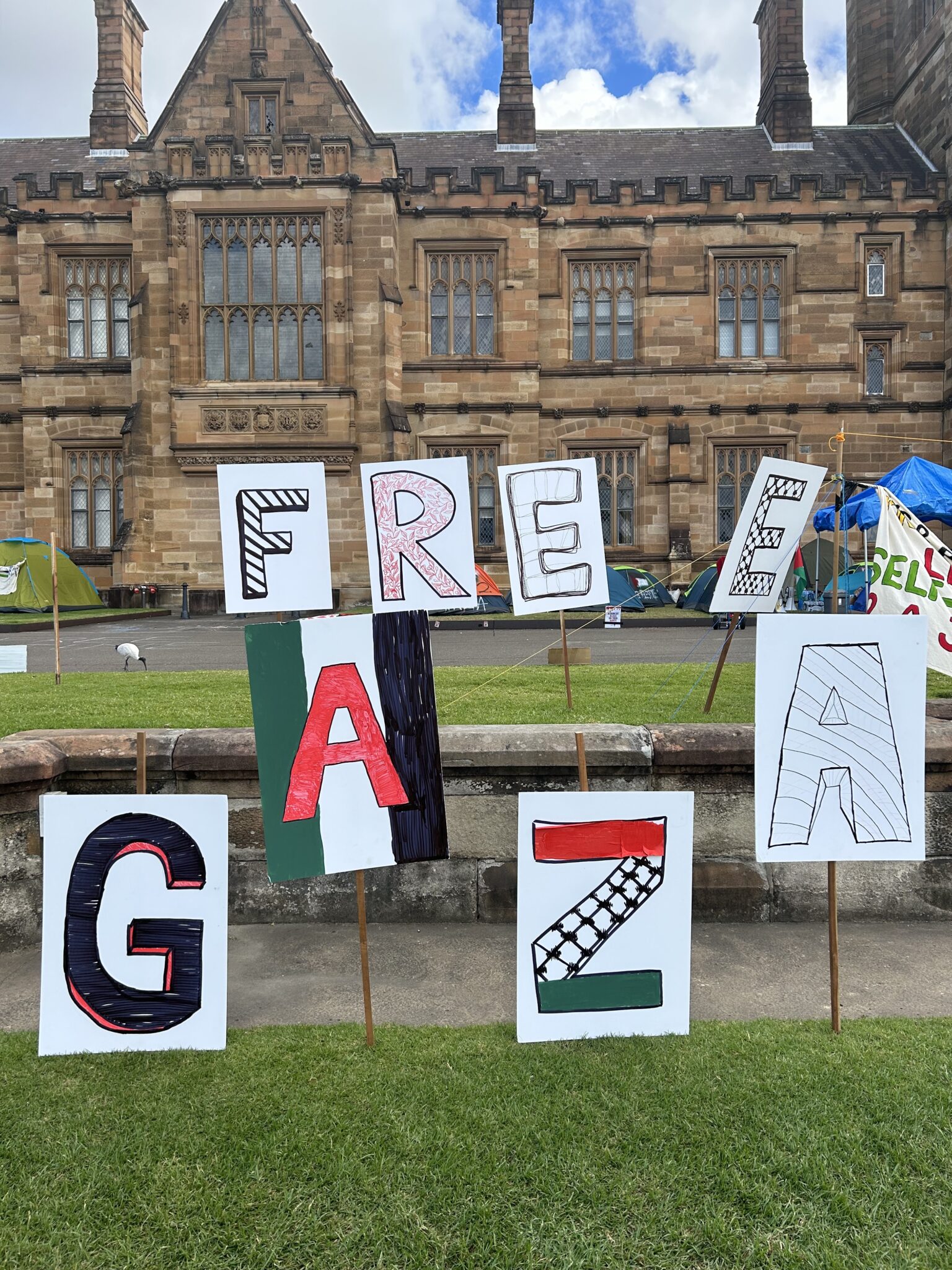Meeting with management
Organisers from the University of Sydney’s Gaza solidarity encampment met with representatives from the University of Sydney’s management team at midday on Friday to negotiate outcomes to meet students’ demands.
Taking place in the Chau Chak Wing Museum boardroom, the meeting was reportedly attended by eight student activists from key factions and groups involved in the encampment. This includes Socialist Alternative (SAlt), Students for Palestine (SFP), Students Against War (SAW), BDS Youth, Grassroots and the Sydney University Muslim Students’ Association (SUMSA).
Since its inception four weeks ago, the encampment has demanded that University management “meet with us and answer our demands”, but not “behind closed doors” or through “secret negotiations.” Last Friday, protestors’ attempts to stage a ‘town hall meeting’ was ignored by University management and transformed into a public forum by guest speakers. At the time of writing, a petition launched by the encampment to hold a Student General Meeting with management is also 150 signatures away from meeting the 2,000 signature threshold.
USyd SRC president, Harrison Brennan, told Honi after the meeting that “elected representatives from the encampment met with the Vice-chancellor Mark Scott, and Provost Annamarie Jagose to demand disclosure of the university’s ties to Israel, divestment from weapons manufacturers, and cutting ties with Israeli academic institutions”.
When asked when the outcome will be announced, Brennan stated, “The University has said they will come back with a proposal next week”.
Following the meeting, all enrolled students at the University received an email from Vice-Chancellor Mark Scott and Provost Annamarie Jagose “met with nominated representatives” to “discuss their views.” They noted that “we listened to the claims put forward by the representatives and had discussions around academic freedom and free speech.” They also confirmed that “the parties have agreed to meet again early next week.”
This meeting comes days after student activists confronted Scott on City Road and at the Wilkinson Building over the University’s ties to genocide, and management’s failure to negotiate with the encampment.
Updates across USyd’s campus
Two organisers of the encampment have also been temporarily suspended this week for making announcements encouraging students to get involved at the beginning of classes and lectures across the campus. In response, University management reportedly sent an email to all staff encouraging them to refuse announcements made about Palestine.
The SRC released an open letter in support of the two students calling the suspension “an attempt by USyd management to silence students exposed USyd’s ties with genocide”. It noted that their disciplinary action was a result of students “doing announcements at the start of classes about USyd’s ties with Israel’s genocide, and encouraging students to be involved in the campaign for Palestine.” As such announcements “do not seriously disrupt teaching activities”, the SRC called this “an attack on free speech” and “the principles of open debate and learning the USyd supposedly holds so dear”.
A source has told Honi that the University has also instructed maintenance teams to paint over all graphics, slogans and artworks calling for a Free Palestine in the Graffiti Tunnel. Workers began removing this signage on Friday morning.

Updates from universities around Australia
The University of Melbourne
Pro-Palestinian protestors at the University of Melbourne (UniMelb) announced an end to their encampment following a meeting with management delegates on Wednesday. After occupying the Arts West building, renaming it to Mahmoud’s Hall by the protestors, and negotiating demands for months, organisers have agreed to disband on the condition that UniMelb provide full disclosure of its ties to Israeli weapons manufacturers and tertiary education institutions like BAE Systems, Boeing Defence and the Hebrew University of Jerusalem.
In a statement to Honi, the editor-in-chief, Joel Duggan of UniMelb’s student publication Farrago said, “For student media as well as student activists, this has been a hectic but deeply meaningful month which epitomises the change student action can bring.”
Duggan also noted, “The University’s decision to disclose is a culmination of months of work from thousands of people and student media will continue to play an important role in holding power to account and being a voice for students.”
Curtin University
On Tuesday, the Curtin Student Guild also reached an agreement with Curtin University’s management for “full disclosure of investments, research, learning, and teaching ties with weapons manufacturers, foreign governments and defence industries.” This includes Curtin’s ties to Lockheed Martin, Babcock Australasia, BAE Systems, NOVA Systems and Huntington Ingalls Industries.
Through a Memorandum of Understanding (MOU), Curtin University has agreed to “disclose the list of organisations the University has dealings with, publish an annual list of all sectors of University investment, divest from suppliers that fail to operate in an ethical manner and release a public position on the war in Palestine.”
However, the Curtin Gaza solidarity encampment released a statement on Thursday evening noting that “the Curtin Student Guild passed an MOU without the approval of the camp. It was done in confidentiality with no regard for the camp’s opinion and signed without the camp’s knowledge. This undermined the democratic nature of the camp.” It also noted that the “public position” stipulated in the MOU “refuses to call what is happening in Gaza a genocide”, and is “utterly unacceptable.”
For this reason, the Curtin camp “rejects the assessment that this is a big win for the campaign and vows to continue to fight for disclosure, divestment, to cut ties and to free Palestine.”
Honi would like to note that these decisions undoubtedly set a precedent for other universities around Australia to pursue disclosure, rather than boycott and divestment, in response to student protestors’ demands.





